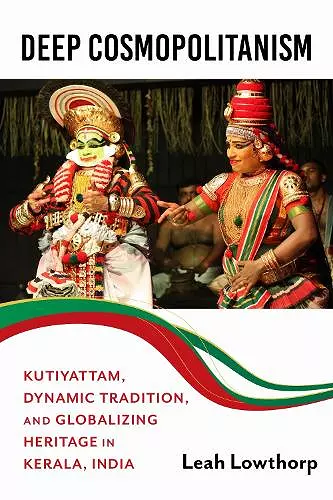Deep Cosmopolitanism
Kutiyattam, Dynamic Tradition, and Globalizing Heritage in Kerala, India
Format:Paperback
Publisher:Indiana University Press
Published:30th Sep '25
Should be back in stock very soon

Deep Cosmopolitanism explores the extraordinary past and present of Kutiyattam Sanskrit theater, the world's oldest continuously performed theater. Recognized as India's first UNESCO intangible cultural heritage of humanity, the matrilineal temple art of Kutiyattam has been performed by men and women in Kerala, India, since the tenth century C.E.
Deep Cosmopolitanism illustrates how Kutiyattam Sanskrit theater has encountered multiple forms of cosmopolitanism over the course of its thousand-year history. Exploring how Kutiyattam artists create meaning out of their deep past through everyday narratives and reflections, author Leah Lowthorp traces the art's cosmopolitan encounters over time, from the premodern Sanskrit cosmopolis to Muslim sultans, British colonialists, Communist politics, and UNESCO intangible cultural heritage. In so doing, Lowthorp fundamentally rethinks the notion of cosmopolitanism from a non-Western perspective with premodern roots and offers a critique of the colonialist undertones of how international heritage organizations like UNESCO conceptualize peoples and traditions around the world.
Diving into an ethnographic exploration that considers Kutiyattam's multiple cosmopolitanisms over a period of one thousand years, Deep Cosmopolitanism offers a model for decolonizing modernity and challenges us to rethink what it means to be cosmopolitan, traditional, and modern in the world today.
"This brilliant and beautifully written book invites us to rethink what it means to be modern, traditional, and cosmopolitan. Insightful and engaging, it offers a compelling ethnographic exploration of the world's oldest theater from the crossroads of anthropology, folklore, performance studies and critical heritage. With depth and subtlety, Leah Lowthorp challenges colonialist binaries as she convincingly decolonizes the notion of cultural heritage."—Valdimar Tr. Hafstein, author of Making Intangible Heritage
"Through her combined ethnography and history of Kerala's Kutiyattam, Leah Lowthorp shows UNESCO's modernist and nation-transcending "heritage of humanity" to be but a short episode within a far deeper, variegated, and ongoing temporal sequence of cosmopolitan positionalities."—Regina F. Bendix, author of Culture and Value: Tourism, Heritage, and Property
"A very local and ancient tradition of Indian classical theater meets a very global and very modern form of the cultural heritage industry, all mediated by a neonationalist Hindu state—with unanticipated and often transformative consequences. Lowthorp's study of the interactions of Kutiyattam, UNESCO, and Modi's India combines thick description with smart conceptualization, and makes a really valuable contribution to cultural and social theory, folkloristics, and the history of this extraordinary art form."—Sheldon Pollock, author of The Language of the Gods in the World of Men: Sanskrit, Culture, and Power in Premodern India
"Leah Lowthorp's book weaves together various disciplines, theories, and methods, achieving two main goals: Firstly, it contributes to the existing, mostly Indological works on Kerala's age-old Kūiyāam Sanskrit theatre by presenting new perspectives through the lens of an ethnographer. Secondly, she aims to decolonize global heritage by rejecting UNESCO's claim to universality and its policy of transforming the supposedly endangered local into the protected global. The book expands our understanding of Kūiyāam as well as deep cosmopolitanism and is a must-read for anyone interested in theatre studies, as well as for those seeking to reassess the concepts of 'tradition' and 'modernity.'"—Heike Oberlin, University of Tübingen, Germany
ISBN: 9780253073594
Dimensions: unknown
Weight: unknown
364 pages